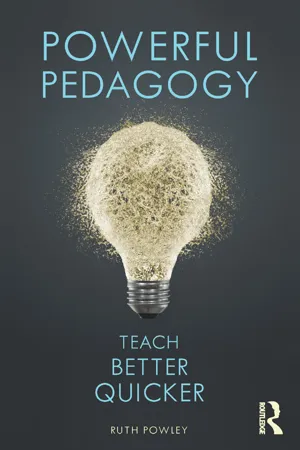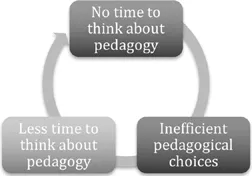
- 182 pages
- English
- ePUB (mobile friendly)
- Available on iOS & Android
About this book
How can we teach better quicker?
In Powerful Pedagogy, Ruth Powley, Love Learning Ideas blogger and experienced teacher and school leader, debunks teaching and learning myths and shows how the more we know about pedagogy, the more able we are to make informed and efficient choices about our practice, saving ourselves valuable time. Focusing on building sequences of learning rather than one-off lessons, it is an antidote to 'quick fix' books, empowering teachers as professionals in possession of 'powerful' pedagogical knowledge that can be used to improve teaching in a sustainable way.
Powerful Pedagogy draws extensively from a wide range of educational writers and research, offering an accessible synthesis of what really works in the classroom. Together with strategies to put theories and research into practice, each chapter contains a handy list of questions for the reflective practitioner. It explores reasons for the confusion over what constitutes effective pedagogy in recent years and presents practical research-based solutions, outlining successful and efficient:
- Modelling of excellence
- Explaining for understanding
- Practising to fluency
- Questioning as assessment
- Testing to permanency
- Marking for improvement
- Effective planning of lessons and curriculum sequences.
Powerful Pedagogy allows teachers to understand how to make the best choices about what works in the classroom, improving the quality of teaching. It is an essential companion for trainee and experienced teachers in all sectors, and for school leaders and educational trainers.
Tools to learn more effectively

Saving Books

Keyword Search

Annotating Text

Listen to it instead
Information
Chapter 1
What is powerful pedagogy?
The high-cost of intervention-loaded teaching
1. Intervention-driven teaching is based on the premise of ‘more’ rather than ‘better.’
2. Intervention-driven teaching runs the risk of creating a vicious circle of inefficient pedagogy:

3. Without a clear understanding of effective pedagogy, extra effort can be wasted.
4. Heavy workload is the main reason for teachers leaving the profession.
Powerful Pedagogy
1. It allows us to deliver more powerful instruction
Table of contents
- Cover
- Half Title
- Title Page
- Copyright Page
- Dedication
- Table of Contents
- Acknowledgments
- Introduction: Why don’t we know what effective teaching looks like?
- 1 What is powerful pedagogy?
- 2 Four principles of effective learning
- 3 Six principles of effective instruction
- Planning for effective instruction Part 1: Planning effective lessons
- 4 Modelling of excellence
- 5 Explaining for understanding
- 6 Practising to fluency
- 7 Questioning as assessment
- 8 Testing to permanency
- 9 Marking for improvement
- Planning for effective instruction Part 2: Designing effective curriculum sequences
- Index
Frequently asked questions
- Essential is ideal for learners and professionals who enjoy exploring a wide range of subjects. Access the Essential Library with 800,000+ trusted titles and best-sellers across business, personal growth, and the humanities. Includes unlimited reading time and Standard Read Aloud voice.
- Complete: Perfect for advanced learners and researchers needing full, unrestricted access. Unlock 1.4M+ books across hundreds of subjects, including academic and specialized titles. The Complete Plan also includes advanced features like Premium Read Aloud and Research Assistant.
Please note we cannot support devices running on iOS 13 and Android 7 or earlier. Learn more about using the app